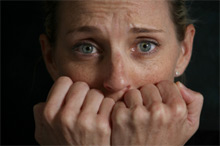To deeply understand fear we must also look at ourselves and the way we interpret our situations. Those scary objects can reveal what we cherish. They point out our insatiable quest for control, our sense of "aloneness."
(Edward T. Welch in "Running Scared.")
I wasn't five minutes into the film before I felt something deep inside of me rebel. That "foreshadowing" device found in excellent literature that honors English students learn to identify and even anticipate, was haunting me from the outset. It didn't matter that I was already aware of the storyline and the satisfactory conclusion of this particular based-on-real-life tale. It still affected me — troubled me.
I couldn't shake that insistent voice inside my head that kept saying, "This is wrong, wrong, wrong." A family was rendered homeless after a job loss, and throughout the film it just felt obscene that something like this could happen in a country like ours. And yet, seeing it on the big screen ignited something that I've had a hard time shaking. I realized that every one of us is just a few steps from some sort of life-altering catastrophe. Your potential pitfall might be a minor illness turned terminal. Another might suffer from job loss or career replacement. Someone else might lose a spouse or child to violence. The neighbor down the road, or in the next apartment, could lose her home. You see, it doesn't really matter how the "displacement" happens or even what form it takes. The bottom line is that every man, woman, and child needs back up, lots of back up.
This entity we term as back-up finds its form through family, friends, or work colleagues who can be counted on to step up and lend a hand during those spaces of time when everything we've got is simply not enough. Think of offering the warm hand of friendship, offering forgiveness, offering whatever it is that someone you know needs as "smart" investment. I'm not talking about giving in the predatory, I'm giving to get, sense. Rather, see people's needs — really see them. Then don't just go home and fret and worry and stew about it. Put feet to your newly acquired vision and set your hands to bringing some relief, some measure of good, where it's most needed.
Whether or not you ever envision yourself as a person in need, the potential is always there. The problem is, ignoring it doesn't make the risk go away and the time will likely come when you're at the mercy of others. Does that frighten you? Maybe it should. It can be a terrifying reality given some people's propensity to blindness when it comes to lending aid. Seeing is believing. We need to open our eyes and our hearts. This might equate to giving until it hurts in our bank accounts, our time, and our talents ... our treasures. Today, look around and willingly take on the role of being a back-up person for someone in need. Maybe in time, that fortunate soul will have your back when you need it.
Takeaway Action Thought: Oftentimes the best remedy to combat anxious uncertainty is to become another person's backup person.
What good is it, my brothers and sisters, if people claim to have faith but have no deeds? Can such faith save them? Suppose a brother or sister is without clothes and daily food. If one of you says to them, “Go in peace; keep warm and well fed,” but does nothing about their physical needs, what good is it? In the same way, faith by itself, if it is not accompanied by action, is dead (James 2:14-17 TNIV).
Weight Bearing Exercises for Body and Soul Health
There are all sorts of remedies being offered for dealing with those sudden intense rushes of anxiety — those inner tugs to bolt from an uncertain situation. Truth is, for as many actual real risks to our safety, there are countless more that hover threateningly within our thoughts. In actuality, we might mentally understand that our fears of uncertainty are just that ... fears founded in the uncertainty of life. Before we realize it, one undisciplined morsel of fear feeds on another, and yet another, until we are immobilized by "what ifs." Our bodies can kick into an automatic cycle of panic that stops us from thinking rationally. The next time your body has a mind of its own and begins to react in panic, give these exercises a try.
- Take several deep breaths. Inhale slowly through your nose; exhale through your mouth. Repeat.
- Focus on tightening/relaxing one body part at a time. Methodically, work through your entire body head to toe.
- Stand up and bend over at the waist. One vertebrate at a time, slowly work up to a standing position. Repeat as needed.
- Self-massage your temples and neck using firm circular motions until you feel the tension disappear.
This article is an excerpt from their book "Burdens Do a Body Good: Meeting Life's Challenges with Strength (and Soul)"
(Hendrickson Publishers, 2010.) Also see their regular online articles at the following sources:
Michele's column: http://www.bizymoms.com/experts/michele-howe/index.html
Dr. Foetisch's column: http://www.bizymoms.com/experts/christopher-foetisch/index.html









Reader Comments
Archived Facebook Comments